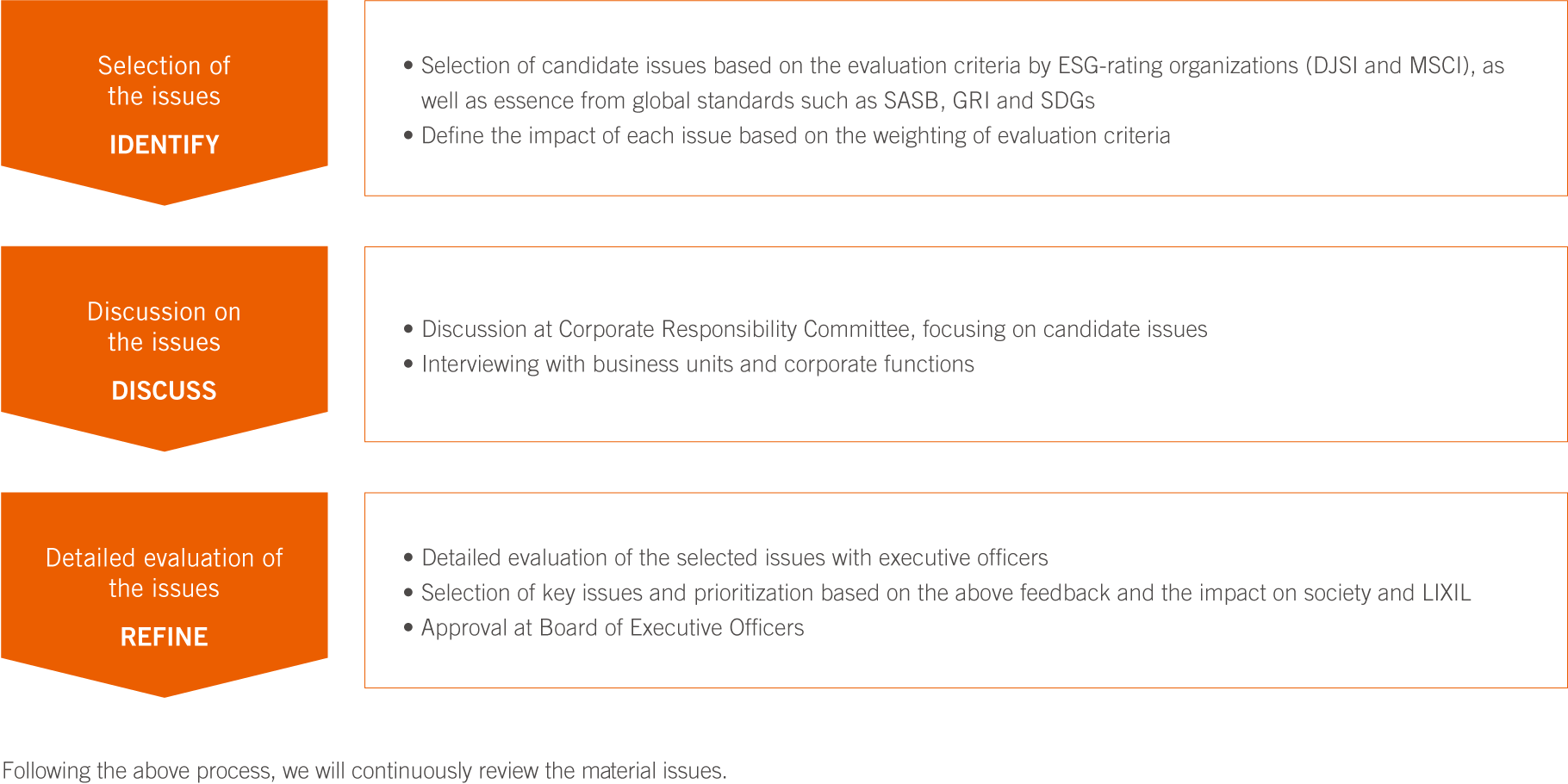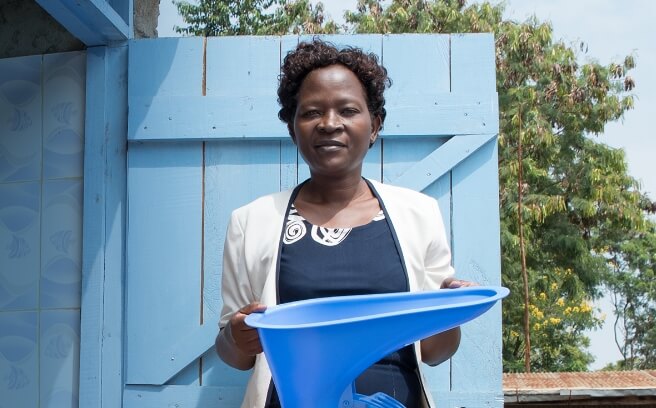LIXIL makes pioneering water and housing products that solve everyday, real-life challenges, making better homes a reality for everyone, everywhere.
- Global Site
-
- English
- Japanese
- Brand Sites
Global
- Global Site
-
- English
- Japanese
- Brand Sites
At LIXIL, we pursue our purpose to “make better homes a reality for everyone, everywhere.” To that end, we have determined material issues that we, our stakeholders, and society in general consider to be of the highest importance for achieving our company’s sustainable growth and improving corporate value for driving progress on sustainable development. We are working to resolve these issues through our business activities while monitoring the progress against our goals.
LIXIL’s material issues are determined by selecting and evaluating issues from both a risk and opportunity perspective using the process below, taking into consideration LIXIL’s Purpose, Value Creation Process (VCP), management direction, Impact Strategy, stakeholder needs and expectations as well as current social circumstances and challenges. We regularly review these material issues to accommodate any changes in LIXIL’s immediate business environment and our society’s expectations at large.
Positioning of Our Material Issues
Our material issues are deeply linked to our VCP, which creates value for stakeholders and broader society based on our Purpose and available resources, as well as to our business strategies and Impact Strategy. To learn more about the connection between the Impact Strategy and our material issues, please follow the link below.
Our Material Issues
In FYE2021, LIXIL renewed its materiality assessment conducted in FYE2016 and identified our material issues based on the process and as listed below. LIXIL endeavors to conduct the renewal of its materiality assessment approximately every three years. To ensure a robust and regular evaluation of our approaches to our Impact Strategy, LIXIL takes into account the complementary nature and integration of our enterprise risk management (ERM) and material issue review processes. We review our material issues, focusing on their impact, associated risks and opportunities at least once a year. This ensures that our findings are promptly incorporated into our relevant risk assessment processes, allowing for necessary updates and actions as needed.
LIXIL positions its most material issues as priority issues. These priority issues include those where LIXIL can have a significant impact on stakeholders and society at large by leveraging our strengths and taking proactive measures, as well as areas where we need to double our efforts based on stakeholders needs, while considering the risks and opportunities assessed in accordance with the evaluation criteria of ESG rating organizations. Our most material issues are deeply related to the three pillars of our Impact Strategy, and we continue to progress various initiatives with a focus on these ‘priority’ material issues.
Preparing for Mandatory ESG Reporting
Our Europe business will be required to adhere to the Corporate Sustainability Reporting Directive (CSRD) and present the material data and information in line with the European Sustainability Reporting Standards (ESRS). This comprehensive set of disclosure requirements encompass a variety of environmental, social, and governance issues that our Europe business will annually report on from the fiscal year ending (FYE) March 2026.
To align with these new reporting mandates, LIXIL initiated a significant project at the beginning of last year to prepare for the CSRD implementation. We are currently finalizing the double materiality assessment and the necessary reporting requirements for our Europe business in accordance with the CSRD guidelines.
Material Issues Assessment Process

Our Material Issues
| Key Priorities | |
|---|---|
|
Global Sanitation & Hygiene |
We seek to promote and enable access to safe and hygienic sanitation practices, especially for women and girls, while preventing the harmful transmission of diseases for children. The SATO brand is LIXIL’s primary driver of R&D and business operations to tackle this challenge as it is tailored to the characteristics and needs of individual markets, including infrastructure, income levels, and environmental restrictions. |
|
Climate Change Mitigation and Adaptation |
To address climate change, we will (further) promote practices toward net zero emission of CO2 from our business processes, products and services and provide solutions for adaptation to climate change. |
|
Water Sustainability |
As a leading company in the water-related product industry, we help achieve global water sustainability by tackling issues such as the scarce access to safe drinking water and the depletion of water resources so that people can get the most out of the water they use. |
|
Circular Economy |
To use limited resources more sustainably, we promote circular manufacturing practices that consider the entire product lifecycle, from raw material procurement through to manufacturing, product use and after use, and minimize waste emission. |
|
Environmental Impact of Product Lifecycle |
LIXIL products are used in people's daily lives for a long period. We promote environment-conscious product design to reduce environmental burden across the product lifecycle and the effects of any chemical substances that the products contain, while also helping to improve the environment for our customers and society at large. |
|
Environmental Management |
We will maintain compliance and improve environmental performance through continuous improvement of appropriate governance and environmental management. |
|
Diversity & Inclusion |
We promote a culture of diversity and inclusion. We are seeking to leverage the knowledge and perspectives of a diverse employee base as the driving force for growth and innovation and to develop products and services that contribute to improving the quality of life for everyone, everywhere. |
|
Conservation of Biodiversity* |
LIXIL’s business activities depend on and affect biodiversity, so we will minimize losses where possible and promote business activities and solutions that contribute to nature positive. |
|
Talent & Development |
Employees are the driving force behind the value creation. With that in mind, we will engage in systematic human resource development and support proactive career development of individual employees. |
| Product Safety | We will improve product quality and safety throughout their lifecycle based on the belief that quality is the key to earning the trust of customers and society. |
| Customer Satisfaction | We will pursue customer satisfaction from the perspectives of both professional users and end users so that our customers enjoy amazing experiences in every aspect of their lives. |
| Employee Safety & Wellbeing | We promote health management for greater corporate value by prioritizing the safety of all employees. |
| Ethics & Integrity | We will build and maintain a culture of compliance where all employees and executives are proud to engage in daily business activities based on high corporate ethics. |
| Human Rights | We position the respect for human rights as a fundamental requirement for business continuity. We are committed to promoting business activities that consider the human rights of all stakeholders, following international human rights principles. |
| Supply Chain Management | We identify risks during procurement and promote responsible procurement of products and stable supply through cooperation with suppliers. |
| Corporate Governance | We will continue to enhance our corporate governance structure. We expressly separate the functions of business execution and supervision to enable executive officers to make management decisions quickly and decisively while securing management transparency. |
| Risk Management | We identify risks that affect business activities, and define particularly important risks as those to be managed with priority. We then manage risks for the entire company by having risk owners share and report the status of responses. |
| Stakeholder Engagement | LIXIL believes that its business activities are supported by a large number of stakeholders. We will contribute to improving the quality of life and solving social issues through active engagement with each stakeholder. |
| Information Security | To ensure the efficient and stable execution of business activities, we will update core systems, strengthen the management of personal information, and establish a system to ensure cyber security. |
| Tax Transparency | We strive to ensure tax transparency and implement appropriate tax payments. |
| Responsible Marketing & Advertising | We seek to provide appropriate information about our products and services. |
* We updated our material issues to include Conservation of Biodiversity in FYE2023.
-
Global Sanitation & Hygiene

-
Water Conservation & Environmental Sustainability

-
Diversity & Inclusion


